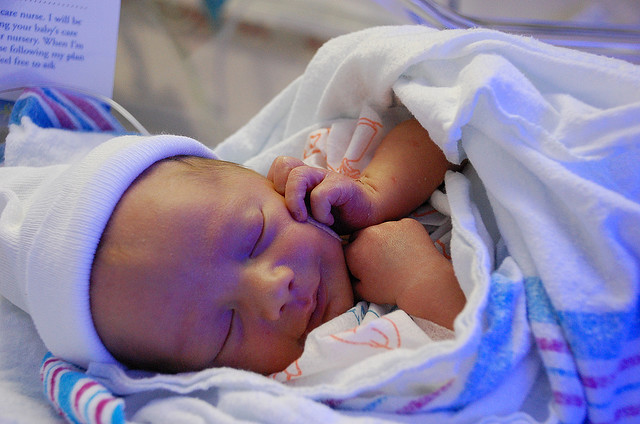Ah, circumcision, such a firey topic you are. Write an article or post an opinion about circumcision, and all sorts of feathers are bound to get ruffled. From accusations of bad parenting on both sides to claims that we should all just worry about our own children and stop talking about it, circumcision is something that gets people all riled up.
I think how we take care of our children is something that everyone should care about. And people should care about ALL children, not just their own. It’s by discussing our opposing views with one another that our own beliefs get challenged and we have to really take some time to evaluate if we want to hang on to our current beliefs and traditions or make space for some new ideas. In our current legal system, infant circumcision ultimately is the mother and father’s choice. I really think it is important to give the topic the energy and thought it deserves before making the decision to circumcise, and understand the implications of this choice.
Here are some reasons the circumcision debate matters:
- Genital integrity is an International Human Rights issue
- According to governing bodies such as Health Canada and the College of Physicians and Surgeons of British Columbia, modern evidence does not support performing circumcision for prophylactic health reasons
- There are medical risks outlined by Health Canada associated with circumcision
- Even though babies are inarticulate, they are still conscious beings who have experiences and form memories, and it is important to consider the psychological impact a potentially painful or unnecessary surgery may have on a newborn child
- Foreskin has a purpose, and removing it has functional repercussions
Do women have a place in the circumcision debate?
It can actually be really common to hear people argue that the decision of whether or not to circumcise should be up to the father. Should women have a say over what adult men do with their foreskin? Absolutely not. Should they have a say over what happens to the bodies of their newborn children? I think yes, of course they should!
Dad’s are important. My own father is one of my favorite people in the whole world, and his parental choices definitely made a valuable impact on my childhood and who I am today. However, let’s face it: generally speaking, women are the nuturers, the caregivers and the ones who were responsible for baby’s health since the moment of conception. They have a mothering, natural, innate and vested interest in their son’s physical and mental health, including the impact of parental choices on his foreskin.
Sometimes it seems that there are more women out there who vocally oppose circumcision than men. I was speaking about this topic with a local “intactivist” a few months ago. He reflected that perhaps more women seem to vocalize the problems with circumcision because women have such a protective instinct built in to care for the baby they’ve been growing inside of them for the last 40+ weeks.
I read a quote the other day that summarizes part of why I am so passionate about birth and maternal health care:
“If we can fix things for mothers ~ and we can ~ we can fix so many other things that are wrong in the world. Women are at the heart of every family, every nation. It’s mostly mothers who make sure children are loved, fed, vaccinated, educated. You just can’t build healthy, peaceful, prosperous societies without making life better for girls and women.” Sarah Brown, White Ribbon Alliance
Yes. I think women have a place in the circumcision debate. Because I believe women have a huge responsibility when it comes to our children and our world.
Why might circumcised men be more likely to defend circumcision?
For circumcised men to embrace the idea that cutting off foreskin is wrong, they might think it means accepting that something “wrong” happened to them, that their own genitals are somehow not-quite-right. It can be much easier to say “Well, this is just what we do. I seem fine. We might as well keep doing it.” Like many things in life, often people are much more comfortable with status quo than really digging into an issue and forming an opinion based on facts, particularly when the issue involves their own personal experiences or their current belief system. This is not to say that circumcised men are inherently incapable of coming to intelligent conclusions. I’m just saying there is potential for emotional bias.
Debating circumcision as it relates to health
Here is a statement from the College of Physicians and Surgeons of British Columbia on the health impact of circumcision:
“Infant male circumcision was once considered a preventive health measure and was therefore adopted extensively in Western countries. Current understanding of the benefits, risks and potential harm of this procedure, however, no longer supports this practice for prophylactic health benefit. Routine infant male circumcision performed on a healthy infant is now considered a non‐therapeutic and medically unnecessary intervention.”
The prophylactic health benefit this quote refers to is the medical reason that used to be given for infant circumcision. It used to be thought that removing foreskin would prevent urinary tract and other infections in boys. However, current research no longer supports this. According to Health Canada, “The overall evidence of the benefits and harms of circumcision is so evenly balanced that it does not support recommending circumcision as a routine procedure for newborns”.
You may have heard of instances where older boys or men end up having their foreskin removed for a medical reason. This definitely happens, although it is rare. I like to compare this to performing surgery to remove any other part of our bodies:
Generally speaking, we wait for organs to show signs of distress before surgically removing them. This is because, although we can go on mostly fine without them, we accept that it’s better to have most of your organs intact when possible. Just like surgery to remove an appendix, something our bodies can function without, we don’t send our newborns off to surgery to get those organs removed right away to prevent them from developing a medical problem later on.
Circumcision and HIV
There were randomized trials conducted that indicated circumcision can reduce HIV transmission by up to 60%. This is part of the basis for a recent campaign to promote circumcision in Africa as a way to fight the AIDs epidemic. The study that’s being quoted here is an extremely controversial one. As outlined in a paper on the methodological, ethical and legal concerns of this particular study, there are problems that make its outcome questionable. Another research paper, from the Journal of Public Healath in Africa, actually shows that promoting circumcision as a tool for fighting HIV may actually increase HIV infections.
It is also important to note that studies looking at the rates of HIV infection in circumcised vs. uncircumcised males in Africa cannot be extrapolated to “developed” countries, because there are multiple compounding cultural and educational variables involved that also contribute to HIV risk which differ significantly between the developed world and African countries.
Male circumcision as it compares to female circumcision
The genital cutting of young girls is illegal in North America. In the circumcision debate, we often discuss whether female circumcision is comparable to male circumcision, and question why one is legal while the other is not. However:
- Neither female nor male circumcision have medical benefits that support it as a routine procedure
- All children have certain universal rights as outlined by the United Nations, regardless of their sex, some of which routine infant circumcision is in direct violation of.
Circumcision as a means of continuing tradition, religious or otherwise
I think as a species, we’ve always been in a position to choose which traditions to pass on and which ones to let go of. My personal belief is that this is one that is better left behind.
Are you considering circumcising your child?
If you are deciding whether or not to circumcise your son, I urge you to take the time to really learn about the process and its risks, what the benefit claims and realities are, and its implications for physical and emotional well-being. Invest some energy into evaluating your opinion on the subject! I encourage you to do some research, and to talk about it with doctors, your peers and other parents, including those who’s opinions differ from yours. If you don’t have a son, talk about it anyway! And dig deep to make sure the decision you make is coming from a place that values the well-being of your son, and our world.

